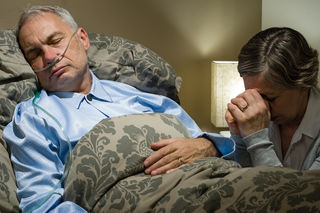Caregiving
Mourning Before Death
Grief and the caregiver.
Posted November 11, 2019 Reviewed by Devon Frye

Grief often begins with the diagnosis. In an instant, your whole world has changed. You are no longer husband and wife, or adult child and parent. Now, one of you is seriously ill or dying, and the other becomes the caregiver.
A parent taking care of a child is something we all expect and accept doing, but becoming a caregiver for your spouse or an aging parent presents an entirely new set of challenges. The grief that begins when your loved one is still alive is called "Anticipatory Grief."
In addition to the ultimate death of your loved one, there are many other losses that can occur along the way. You begin to mourn the loss of the relationship you had, as well as the one you had hoped for in the future. It is painful to watch your loved one change from a strong and capable person to someone who may need help with the simplest of tasks. If your loved one suffers from dementia, at some point, they are likely to forget your name. There is so much pain and heartache for the caregiver as the one you love comes closer to death.
Not only is the caregiver mourning the losses in their relationship with their loved one but also the changes within themselves. Research indicates that between 40 and 70 percent of caregivers demonstrate significant depression and anxiety. Those who take care of someone with dementia experience the highest levels of depression.[1]
Caregiving affects us on all levels: physically, emotionally, and spiritually. Most of the time, family caregivers are ill-prepared to do what needs to be done. It is not unusual to feel overwhelmed and helpless.
Caregivers often have to learn new skills, such as managing medication, taking care of finances, cooking, bathing, or helping with toileting. Wanting to do the best for their loved one, caregivers worry about making mistakes that could potentially worsen their loved one’s situation. Juggling work, caregiving, and other family responsibilities can be exhausting.
Even if you are not providing the physical care for your loved one, having a paid caregiver can still be stressful and overwhelming. Finding the right person or people, making out the schedules, and monitoring the care being given means that even though you may not physically be at home, your mind is never fully anywhere else. When the unexpected happens, and the caregiver cannot come in, it can throw the whole system into chaos with last-minute rescheduling.
I have had clients tell me how frustrating and stressful it was for them working things out with a paid caregiver. It was one of the most difficult things they had to do in taking care of their loved one. It seems that providing care yourself or paying someone else can both be highly stressful experiences.
Grief is not the only emotion that caregivers experience. There is also depression, anxiety, anger, hopelessness, guilt, resentment, and relief. All of these are normal.
When we become caregivers to someone else, we often forget to be one for ourselves. While we are taking care of someone else's mind and body, we forget to take care of our own. It is often too easy to let caregiving take over your life. However, it is essential for your well-being that you not allow this to happen. It is important that you, as a caregiver, be able to ask for help and say no when necessary.
All the basics apply: Remember to eat, get enough sleep, exercise, and have time away from the house and your responsibilities. When you catch yourself holding your breath, remember to breathe. Taking several full, deep breaths can help to put you back on track. At times, you may just want to go into another room and listen to music or read a book.
Get a monitor, so you do not always have to be in the room. Step outside. Go for a walk. Find something that makes you laugh: a movie, TV show, or book. Join a caregiver support group. For some, getting counseling would also be beneficial. For those working outside the home and serving as a caregiver, consider taking a short-term medical leave of absence.
There are also facilities that offer respite help. Be sure to investigate those resources in your area. There are many grief self-help books available, as well as online caregiving sites that can be helpful. Remember, the work you do is meaningful yet hard. Taking better care of yourself helps everyone.




